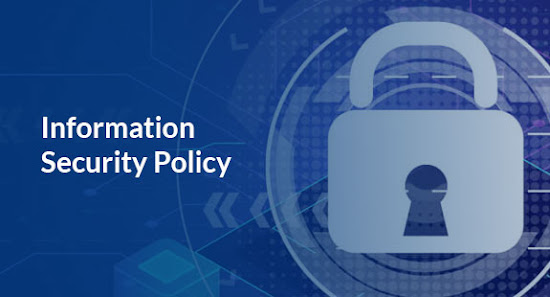Information security policies A pillar of security for your organization foundation.
In the rapidly advancing landscape of technology, the protection of sensitive information is paramount. Establishing robust Information Security Policies and IT Security Policies is not just a best practice; it's a strategic necessity for organizations navigating the complexities of the digital age.
Information Security Policies: Building a Fortified Foundation
An Information Security Policy serves as the cornerstone of an organization's commitment to safeguarding its data. This comprehensive document outlines the protocols and procedures that govern the protection of information assets. From data classification and access controls to encryption standards and incident response plans, Information Security Policies provide a roadmap for maintaining the confidentiality, integrity, and availability of critical information.
 |
| Information security policy |
Crafting and implementing Information Security Policies is a proactive measure that enables organizations to anticipate and mitigate potential risks. By establishing clear guidelines for employees, vendors, and other stakeholders, these policies contribute to creating a culture of security awareness throughout the organization. Information Security Policies not only address current security concerns but also adapt to the evolving threat landscape, ensuring a dynamic and resilient defense against cyber threats.
IT Security Policies: Bolstering Technological Defenses
Complementary to Information Security Policies, IT Security Policies focus on the specific measures and protocols related to technology resources. These policies encompass a wide array of considerations, including network security, system configurations, software management, and user access controls. By defining best practices and expectations in these areas, IT Security Policies contribute to the overall cybersecurity posture of an organization.
The significance of IT Security Policies extends beyond technological considerations; they play a crucial role in regulatory compliance and risk management. By aligning IT practices with industry standards and legal requirements, organizations can mitigate potential threats and build resilience against cyber-attacks. Moreover, these policies ensure that technology resources are utilized efficiently, minimizing the risk of unauthorized access and data breaches.
 |
| IT security policies |
The Strategic Impact of Comprehensive Policies
- Proactive Risk Management: Information Security Policies and IT Security Policies empower organizations to identify, assess, and proactively manage potential risks. This strategic approach minimizes vulnerabilities and strengthens the organization's defense against cyber threats.
- Regulatory Compliance: In an era of stringent data protection regulations, having well-defined Information Security and IT Security Policies is crucial for compliance. Adhering to these policies helps organizations meet legal requirements and industry standards, fostering trust with customers and partners.
- Cultivating a Security Culture: Comprehensive policies contribute to the cultivation of a security-conscious culture within the organization. When employees understand their roles and responsibilities in safeguarding information and technology resources, they become active contributors to the organization's overall security posture.
In conclusion, the establishment of Information Security Policies and IT Security Policies is not just a box to be checked; it is a strategic investment in the resilience and longevity of an organization. By adhering to these policies, businesses can navigate the dynamic digital landscape with confidence, knowing that they have a fortified foundation for safeguarding their information and technology assets.To know more about different organizational policies please do visit



Comments
Post a Comment